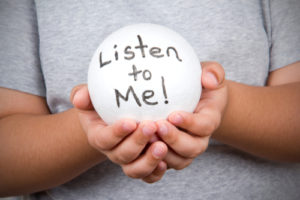


Separation is a stressful time for parents and children. Parents are often angry and hurt or feeling guilty about what is happening. Unfortunately, this often means that the needs of any children involved are overlooked or become buried in the negative emotions that are swirling around them, Even more concerning is that the children themselves can become a weapon to use against the other parent.
It is important to understand that how you deal with matters now will have a lasting impact on the children that you share with your former partner. You may no longer be life partners but you remain in a “partnership” as parents that will last potentially a lifetime – even once a child reaches the age of 18 there are numerous life events when they will wish both of their parents to be there.
When dealing with the children, it is what is right, not who is right. Your ex may have been a bad partner, or even an abusive one, but that does not necessarily mean that they are or will be a bad parent. Equally, your ex may have had little to do with your joint children whilst you were together but can develop a loving relationship when having to spend time alone with them. Some parents parent better apart.
There has been a great deal of research which has shown that children who can have a close and loving relationship with both parents will on average do better than those who do not. It is also clear that given the opportunity it is better for a child to identify their parent’s failings for themselves rather than having the other parent spell them out. Remember they love you both and that is a good thing.
Over the years it has been possible to hear the children’s voices when it comes to how best to help them when you separate, and these are some of the things that most of them say:-
Your children need, and deserve, an explanation why one of you is leaving home. It is easy for children to believe that they are the cause of their parent’s separation however unreasonable that belief may be. Try and ensure that they have as much warning as possible and remember to tell them in a way they can understand. If you can do it together then do so, if that is not possible then agree on what you will say to them.
All children need to know is that you are parting because you can no longer live happily together, but that it does not alter your feelings for them and that you both still love them.
However much you are hurting in terms of the children you need to try and understand the pressures on the other parent – whether it is understanding how devastating it is to have limited time with your children – or how overwhelming it is to be single handedly caring for the children all day every day.
Do not use the children as your support network – that is not their role, they need your support not to spend their days worrying about your problems.
Children see and hear more than we think. Not only should you not argue in front of them, but also you should make sure they cannot hear you when you speak to your friends and family about what has happened and how you feel. Children struggle if they regularly hear parents criticize each other and it impacts them at school and indeed everywhere else. Make sure the school are aware of the separation and ask about what support might be available there.
The continuing conflict between you and your partner during and after separation, will not only undermine your effectiveness as a parent but is far more likely to adversely affect the children than the separation itself.
Children do not just need to see the other parent – they need to be able to do everyday things with them such as eating, playing going to bed and getting up. They want to be able to relax in both their homes and have space to be themselves. It may take time to establish this but that is the aim that you should work towards whenever that is possible.
Whilst no child should be asked to decide who they live with or when they see the other parent (such questions are without doubt abusive), nonetheless they should be allowed to have a say in what is happening and to have their feelings taken into account. It is also important to remember that as they grow older children develop their own lives and both parents need to remember that arrangements will need to change to accommodate this
Children do not mind if parents do things differently, they can cope with different rules in different places. However, remember that when they return to your rules there may be a period where they seem upset. This is normal and not a sign that there is something wrong. It is of course annoying – but then children often are and still we love them
There are several books and websites which are children friendly and can help children understand what is happening. Remember that whilst they are often sad or angry, your children can cope and get on with their lives but only if you do. If you don’t they can’t.
Dated: 16.04.2024
Call us now, our phone lines are open 24 hours a day, 7 days a week 01302 349 480 or fill out our enquiry form here
Our friendly staff are on hand to answer any of your questions.